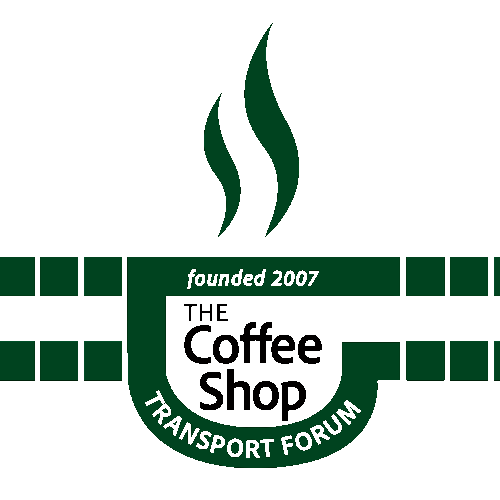| Re: Petition for mileage based fares Posted by Bob_Blakey at 13:06, 25th November 2024 |     |
How would you classify a journey from PNZ to PAD ?.....
Using the journey distance + journey speed 'algorithm' I suggested, with the addition of items mentioned by Graham - particularly the level of computing power now available to deal with complex calculations - the rail network would be divided into individual station-to-station sections each of which would be 'allocated' to a service as appropriate. On this basis a trip from PNZ to PAD would almost certainly be aggregated from a significantly lower £/mile (ppm) cost from PNZ>PLY than PLY>EXD, EXD>RDG and RDG>PAD; the actual journey speed values per station stop to station stop for 1A73 (0503 from PNZ) are:
PNZ>RED 0.84
RED>TRU 1.00
TRU>SAU 0.90
SAU>BOD 0.82
BOD>LSK 0.83
LSK>STS 0.97
STS>PLY 0.38 (!)
PLY>NTA 0.91
NTA>EXD 1.06
EXD>TAU 1.27
TAU>RDG 1.29
RDG>PAD 1.48
which largely confirms my initial supposition.
Other considerations might be the type of traction used for the E2E journey.
| Re: Petition for mileage based fares Posted by ellendune at 09:13, 25th November 2024 |     |
Can I suggest that we freeze the fares of standard class tickets over a certain threshold (pence per mile) for a while to reduce the disparity to some extent.
| Re: Petition for mileage based fares Posted by grahame at 07:05, 25th November 2024 |     |
I have put a calculator at https://www.greatwesternrailway.info/fairfare.html and you can experiment from there. Please forgive the poor formatting so far.
Formatting somewhat improved. But putting figures in based on a milage solution shows up the real problems of an inversion of the usual purchasing rules in the current system.
"The more you buy, the lower cost it is per unit" is a pretty standard thing when you go into the supermarket - compare the costs of a large, medium and small jar of coffee / bag of potatoes / box of cereal. And yet on train fares we currently have an inversion of this - the short journey is often cheaper per mile than the long one, even on the same tracks, leading to the perverse practice of split ticketing.

My default fare test for a 100 mile journey such as Melksham to London gives me:
Projected anytime fare £59.90 single and £115.80 return
Projected off peak fare £35.94 single and £69.48 return
Which HMG will object to because a normal anytime return is £215.20 and a superoffpeak is £68.10Projected off peak fare £35.94 single and £69.48 return
But if I change only the 100 miles to 25 miles - example Melksham to Swindon - it gives me
Projected anytime fare £17.00 single and £31.40 return
Projected off peak fare £10.20 single and £18.84 return
Which the passenger will object too because a normal anytime return is £12.50 and off peak is £9.20Projected off peak fare £10.20 single and £18.84 return
This is without any of that bias at all that I have talked about station-to-station but even if that were pushed to the extreme for Swindon - Didcot it would not fix this inversion issue. Changing the fixed price for going a train to a negative value could help and would make very local journeys (Westbury to Dilton Marsh?) free of charge or in theory end up with the railway paying you (and that would be the end of fare evasion on local West Wilts services
 )
)| Re: Petition for mileage based fares Posted by grahame at 18:47, 24th November 2024 |     |
All I need to do now is to define the factors and write a script to work out your fare.
And demonstrate to the DfT that they won't lose a shed load of income as a result.
And fend off the press when they find the fares that will go up significantly as a result.
And...

Yes - lots of "and"s.
I have put a calculator at https://www.greatwesternrailway.info/fairfare.html and you can experiment from there. Please forgive the poor formatting so far.
| Re: Petition for mileage based fares Posted by IndustryInsider at 16:45, 24th November 2024 |     |
All I need to do now is to define the factors and write a script to work out your fare.
And demonstrate to the DfT that they won't lose a shed load of income as a result.
And fend off the press when they find the fares that will go up significantly as a result.
And...

| Re: Petition for mileage based fares Posted by grahame at 14:01, 24th November 2024 |     |
One of the fascinating things we have available these days which we did not have when the fares were set is computing power to allow much more complex dynamic calculation - for the calculations to be more complex but the algorithms simple.
Let's start with routing for walk-up tickets:
1. The shortest route is always allowed. And It is the basis for fare calculation.
2. Direct (through) services are always allowed
3. When you walk up the train combination that will get you there earliest is always allowed.
If it does not add more than 10% to the distance, this route too is treated as the shortest route
If you are following a route according to 1, break of journey is allowed, otherwise not.
Pricing. For an anytime single ticket
1. Each station to station leg has a price based on the distance between stations - in other word "x pence per mile". However, there may be a quality of service and infrastructure factor applied to that, somewhere (bar exceptional circumstances) between 0.8 and 1.2. A "for instance" might be that the Pilning to Severn Tunnel Junction factor is 1.2 and looking at the other end of the scale, some northern legs already mentioned (Hammerton to Cattal) might come in at 0.8.
2. Add a fixed fee - call in "station use" if you like - of "y pence"
3. Add up the grand total and it's a base fare of "z".
4. Actual fare charged is the full base fare up to amount "a", then discounted by 20% up to amount "b" and discounted by 40% in excess of that. Sort od inverse way that taxation works.
You ARE allowed to chose your own "via"stations in which case it's price that way
For a return ticket - work out the distance in just the same way - except it's double. So when you come to step 4, a return ticket will be cheaper than 2 singles because of the discount levels. Return ticket validity based on distance - valid for out and back journeys completed within 50 hours.
First Class, plus 40%
Off Peak - valid for travel except at any time 07:30 to 09:00 and journeys starting between 16:30 to 19:00 on Monday to Friday - minus 20%.
Season tickets - based on a fare cap of 7.5 single journeys per week; Rangers and rovers based on a fare cap within the areas covered.
All I need to do now is to define the factors and write a script to work out your fare.
| Re: Petition for mileage based fares Posted by Trowres at 12:52, 24th November 2024 |     |
The current confused system of "market-based" fares arrived in the 1970's when BR started to try to fill off-peak capacity. Prior to that (and also subsequently for many years) the main offer on tickets was a normal or full fare ticket, or a cheap day return. I would hazard a guess that the single fare was around half the full return fare (please correct me if this was not so). BR did in fact taper longer distance fares to make them realistic (or affordable!). How this was done may be lost in the mists of time. Now all these fares had historic origins but very likely had some basis in being distance based.
...
Split ticketing is really nothing new either. I imagine many may remember having to purchase a series of cheap day returns at each of the relevant ticket offices. This was in order to make an extended day trip more affordable since cheap day returns were generally only available for up to 50 miles and for specific routes only.
...
Split ticketing is really nothing new either. I imagine many may remember having to purchase a series of cheap day returns at each of the relevant ticket offices. This was in order to make an extended day trip more affordable since cheap day returns were generally only available for up to 50 miles and for specific routes only.
Prior to the introduction of "Savers", and at least as late as 1982, the general offering seemed to be Standard Single / Return, Monthly Return, Weekend Return and Day Return, in decreasing order of price per mile.
The day return didn't have a distance cap, either. Certainly, Newport-Newcastle was available in Feb 1982 (£27).
I have a leaflet for an early form of Groupsave, back in 1977. The quoted fare from Newport to Newcastle (available Saturdays only) was £6.84

| Re: Petition for mileage based fares Posted by Mark A at 12:03, 24th November 2024 |     |
Split ticketing is really nothing new either. I imagine many may remember having to purchase a series of cheap day returns at each of the relevant ticket offices. This was in order to make an extended day trip more affordable since cheap day returns were generally only available for up to 50 miles and for specific routes only.
This chimes with an account I read from a couple of young residents of Nottingham who travelled to Leicester on a (rail-related) explore, day returns from Victoria to Loughborough and Loughborough to Leicester making the excursion rather more affordable than it would otherwise have been.
Mark
| Re: Petition for mileage based fares Posted by WSW Frome at 11:51, 24th November 2024 |     |
The current confused system of "market-based" fares arrived in the 1970's when BR started to try to fill off-peak capacity. Prior to that (and also subsequently for many years) the main offer on tickets was a normal or full fare ticket, or a cheap day return. I would hazard a guess that the single fare was around half the full return fare (please correct me if this was not so). BR did in fact taper longer distance fares to make them realistic (or affordable!). How this was done may be lost in the mists of time. Now all these fares had historic origins but very likely had some basis in being distance based.
If someone was bold enough there could be some merit in using an older BR fares manual as a template to start introducing a more logical system. Unlikely to happen since BR is still regarded as bad in many official eyes and of course, modern "marketing" is an industry in itself to create a desirable and also "profitable" product.
Split ticketing is really nothing new either. I imagine many may remember having to purchase a series of cheap day returns at each of the relevant ticket offices. This was in order to make an extended day trip more affordable since cheap day returns were generally only available for up to 50 miles and for specific routes only.
| Re: Petition for mileage based fares Posted by PhilWakely at 11:15, 24th November 2024 |     |
Fares based purely on mileage would mean big rises on rural routes that are currently much cheaper.
Compare Swindon to London with Scarborough to Goole which are roughly the same distance apart.....
Compare Swindon to London with Scarborough to Goole which are roughly the same distance apart.....
Straightaway we have, as I indicated, one potential variation which might produce a better result; Swindon to Paddington is obviously a fast 'InterCity' route whilst Scarborough (SCA)<>Goole (GOO) quite clearly isn't. So possibly look at a mathematical combination of distance and average speed over the route (or journey) to set fares e.g. SCA to York (YRK) via Malton (MLT) is only operated by TPE and takes c.50 minutes to cover the 42 miles while the Northern service via Kingston-upon-Hull (HUL) is roughly 105 miles / 100 minutes, giving 0.84 & 1.05 miles/minute (mpm) respectively. SWI to PAD is 77 miles in 51>61 minutes at 1.26>1.51mpm. Closer to home one can travel the 28 miles between EXD & PGN with either GWR (c.65 mins) or XC (c.41 mins) giving values of 0.43 & 0.68 respectively. For a local comparison EXD to BNP throws up a 'standard' value of 0.5mpm although early morning trains come in at closer to 0.60mpm. Better minds than mine might be able say whether this type of approach would be at all workable.
How would you classify a journey from PNZ to PAD ? EXD roughly halfway, with fast services between PAD and EXD, but the same service takes almost one third longer between EXD and PNZ.
| Re: Petition for mileage based fares Posted by Bob_Blakey at 10:15, 24th November 2024 |     |
Fares based purely on mileage would mean big rises on rural routes that are currently much cheaper.
Compare Swindon to London with Scarborough to Goole which are roughly the same distance apart.....
Compare Swindon to London with Scarborough to Goole which are roughly the same distance apart.....
Straightaway we have, as I indicated, one potential variation which might produce a better result; Swindon to Paddington is obviously a fast 'InterCity' route whilst Scarborough (SCA)<>Goole (GOO) quite clearly isn't. So possibly look at a mathematical combination of distance and average speed over the route (or journey) to set fares e.g. SCA to York (YRK) via Malton (MLT) is only operated by TPE and takes c.50 minutes to cover the 42 miles while the Northern service via Kingston-upon-Hull (HUL) is roughly 105 miles / 100 minutes, giving 0.84 & 1.05 miles/minute (mpm) respectively. SWI to PAD is 77 miles in 51>61 minutes at 1.26>1.51mpm. Closer to home one can travel the 28 miles between EXD & PGN with either GWR (c.65 mins) or XC (c.41 mins) giving values of 0.43 & 0.68 respectively. For a local comparison EXD to BNP throws up a 'standard' value of 0.5mpm although early morning trains come in at closer to 0.60mpm. Better minds than mine might be able say whether this type of approach would be at all workable.
| Re: Petition for mileage based fares Posted by TaplowGreen at 09:54, 24th November 2024 |     |
Given the level of service GWR are currently delivering, the suggestion of any increase in fares (which would seem inevitable, and in some cases dramatic given the formula being suggested) seems truly bizarre.
| Re: Petition for mileage based fares Posted by broadgage at 09:32, 24th November 2024 |     |
I see at least two arguments a simple mileage based fare.
Firstly, local commuting should arguably be subsidised out of public funds as it is a "public good" The vast numbers of workers in London and other large cities cant all drive to work as there is not the road capacity or parking spaces. There is not sufficient housing available near enough for more than a small minority to walk or cycle to work.
Therefore train travel from say Reading to Paddington needs subsidy.
Travel from Taunton to Paddington is arguably less deserving of subsidy, living in Taunton and working in central London is a lifestyle choice, for which the user must expect to pay. Travel between Reading and London is NOT a lifestyle choice, London employers need workers, and these workers need affordable public transport from Reading, and other nearby places.
There is also a second argument, which SOMEWHAT contradicts the first one.
Running a train between London and say Penzance costs of certain sum. The two main factors to consider, are providing enough capacity to avoid standing/overcrowding on the inner part of the route to say Taunton, and also providing a reasonable service to Penzance.
Having incurred the largely fixed costs PER TRAIN it could be argued that travel to Penzance should cost no more than to Plymouth. It costs a certain amount to run enough trains, so does it really much matter how far a passenger travels?
I therefore doubt that a mileage based system would work well, keep the present system but look again at any fares that appear extremely cheap or expensive, and consider alterations unless some good reason can be found to retain apparently odd fares.
| Re: Petition for mileage based fares Posted by IndustryInsider at 01:02, 24th November 2024 |     |
Fares based purely on mileage would mean big rises on rural routes that are currently much cheaper.
Compare Swindon to London with Scarborough to Goole which are roughly the same distance apart. The latter is less than half the cost for the cheapest return ticket currently, but is less frequent and takes almost twice as long.
Surely the option of increasing one fare or lowering the other could never be an option?
| Re: Petition for mileage based fares Posted by eXPassenger at 17:37, 23rd November 2024 |     |
Distance related fares are something that I have supported for quite some time; the price of any service, particularly one partially funded by the tax payer, should to some extent reflect the cost of providing it. I fully understand that this is not a simple calculation, and there are a myriad of things (potential variations) to be considered before settling on an appropriate £/mile metric.
I would imagine the cost of tickets on services such as the Night Riviera would be unaffordable to just about everyone were that formula to be followed.
A potential solution would be to taper the cost of rail travel over a specified distance.
For example:
First 150 miles x p/mile
Next 50 miles .75 x p/mile
Next 50 miles .50 x p/mile
This algorithm would be published as part of new mileage based fares. Similarly off peak fares could be charged as a specified % of the standard fare.
| Re: Petition for mileage based fares Posted by TaplowGreen at 16:27, 23rd November 2024 |     |
Distance related fares are something that I have supported for quite some time; the price of any service, particularly one partially funded by the tax payer, should to some extent reflect the cost of providing it. I fully understand that this is not a simple calculation, and there are a myriad of things (potential variations) to be considered before settling on an appropriate £/mile metric.
I would imagine the cost of tickets on services such as the Night Riviera would be unaffordable to just about everyone were that formula to be followed.
| Re: Petition for mileage based fares Posted by Bob_Blakey at 11:38, 23rd November 2024 |     |
Distance related fares are something that I have supported for quite some time; the price of any service, particularly one partially funded by the tax payer, should to some extent reflect the cost of providing it. I fully understand that this is not a simple calculation, and there are a myriad of things (potential variations) to be considered before settling on an appropriate £/mile metric.
But I do not accept that just because a particular area has been benefitting from what are effectively discounted fares since the year dot that this should be allowed to continue; not that long ago cheaper Off-Peak tickets from/to Avocet Line stations into/out of Exeter were completely withdrawn in favour of the Anytime product and I don't recall any public protests or reduction in passenger numbers.
The DfT civil service number crunchers should be tasked to look at the current situation in terms of £/mile fare variations nationally.
| Re: Petition for mileage based fares Posted by stuving at 16:12, 22nd November 2024 |     |
10 years ago today - isn't it amazing how long it's taking to sort out fares.
No. RDG and DfT have been passing this buck back and forth for years, so obviously it's something that scares them. And for good reason - any change would be seen as worse for them by a lot of people. We all know that when affected by something changing, those who gain barely notice and forget within a week or two, while those who feel hard done by bear a grudge for years.
I'm sure RDG would have accepted a radical simplification, and might have quite liked some aspects, such as having a lot of aggro about validity go away. But they really wanted to have a big say in the new system, but for it to be seen as imposed on them, so they could keep saying anything unpopular wasn't their fault.
| Re: Petition for mileage based fares Posted by grahame at 14:22, 22nd November 2024 |     |
10 years ago today - isn't it amazing how long it's taking to sort out fares.
| Re: Petition for mileage based fares Posted by LiskeardRich at 21:21, 22nd November 2014 |     |
Some areas have really cheap fares that would lose out.
Living in corwall and making most of my journeys around Cornwall I don't support this petition at concern our prices would increase as a result.
Certain parts of the country rightfully have higher or lower fares than other areas based on many variables which wouldn't be right to level out over the whole nationwide networks
| Re: Petition for mileage based fares Posted by ChrisB at 21:10, 22nd November 2014 |     |
Bang would go your Advance fares....but I agree something's necessary
| Petition for mileage based fares Posted by grahame at 20:50, 22nd November 2014 |     |
https://you.38degrees.org.uk/petitions/rail-fares-that-make-sense
To make railway ticket charging regulations that force all railway companies to charge fares based on distance travelled irrespective of which train company is used and where the journey is made.
Why is this important?
We have a bewildering number of train tickets available, which can sometimes mean that for a long journey it is cheaper to buy 2 single fare tickets rather than one single fare ticket. Also, a return ticket can be cheaper than a single. It can even be cheaper to buy a ticket from one train company's ticket machine than from another train company's machine. Travelling to London Victoria can be cheaper than travelling to Clapham Junction (a shorter distance for me).
Looking at a ticket machine screen can make your head spin, when all you want to do is get from A to B and be charged for the distance travelled.
Legislation is needed to impose logic and fairness.
Why is this important?
We have a bewildering number of train tickets available, which can sometimes mean that for a long journey it is cheaper to buy 2 single fare tickets rather than one single fare ticket. Also, a return ticket can be cheaper than a single. It can even be cheaper to buy a ticket from one train company's ticket machine than from another train company's machine. Travelling to London Victoria can be cheaper than travelling to Clapham Junction (a shorter distance for me).
Looking at a ticket machine screen can make your head spin, when all you want to do is get from A to B and be charged for the distance travelled.
Legislation is needed to impose logic and fairness.










